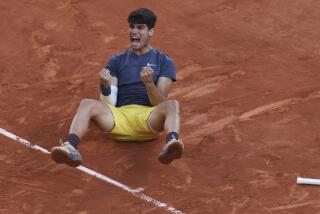Sanchez Shows That Graf Isn’t Reign-Proof
- Share via
PARIS — Arantxa Sanchez celebrated what is probably the biggest upset in the women’s final of the French Open by rolling on her back on center court at Stade Roland Garros.
What was she thinking?
“I have beaten the No. 1 player in the world,” Sanchez said.
She was as stunned as everyone else. Sanchez, a 17-year-old Spaniard appearing in her first Grand Slam final and ranked 10th in the world, jolted women’s tennis right down to its foundation.
Sanchez defeated Graf, 7-6 (8-6), 3-6, 7-5, Saturday, which means she took 2 hours 55 minutes to serve notice that the future of women’s tennis is now.
Since Graf became No. 1 in August 1987, she had put up a wall of almost total invincibility that only a few were able to crack. Graf’s record since 1987 was 193-6 coming into her final against Sanchez, who had not managed to take a set from her in their three previous matches.
What’s more, Graf was seeking her seventh Grand Slam title, and just about everyone regarded her as the odds-on favorite to win a second consecutive Grand Slam--to win all four of tennis’ major tournaments in one year.
Graf managed to find at least one positive element in her defeat.
“No more questions about the Grand Slam, I guess,” she said.
Graf’s defeat was not only unexpected, but the manner in which she lost was unprecedented for her.
She served for the match at 5-3 in the third set but did not win a point.
She served at 5-5 and again did not win a point.
It was a total collapse. The Steffi graph dropped off the charts. From 5-3 in the third set to the end of the match, a span of four games, Graf won only four points.
Last year, when Graf took her second French Open title, she routed Natalia Zvereva of the Soviet Union, 6-0, 6-0, in 34 minutes and gave up a total of 13 points.
Since 1897, the French Open has had a women’s singles final, but Graf’s loss was called the most shocking.
“It most certainly is the biggest (upset) in the French Open final,” said Ted Tinling, a women’s tennis historian for more than half a century.
Clearly, it is the biggest upset of the Open era, which began in 1968.
Graf, the heavy favorite, the defending champion, the world’s best player, wound up losing. How?
First, there was the emotional edge. It belonged to Sanchez, who said she was inspired by Michael Chang.
“I saw Chang beat Lendl, so I say, ‘Why not?’ ” Sanchez said.
Then there was the physical edge, which Graf also lacked. She said she was bothered by periodic cramps and had to leave the court before the final game to get help.
Graf also said she felt weak for the last three days and lost about seven pounds, the result of a stomach virus, she said.
“I didn’t feel the best at the end,” Graf said.
And who could blame her? Even though her play was mostly inconsistent up to that point, Graf seemed to be on the verge of winning anyway. Sanchez missed a forehand wide on break point to give Graf a 5-3 lead.
Quickly down, 0-30, Graf stroked a forehand deep into the corner that Sanchez could only lift meekly toward Graf’s waiting racket.
All Graf had to do was touch the ball and drop it on the other side. But instead, she dumped the ball into the net.
“I don’t know how I missed it,” she said.
When Graf sailed a forehand long, Sanchez broke back and was on her way toward doing something she had only dreamed about.
“I fought for three hours just to see if I could win the tournament of my life, the one I dreamed about,” she said. “I am very proud.”
She is also very smart. Guided by Juan Nunez, her coach of four weeks, Sanchez attacked Graf where she is most vulnerable--her backhand. Nunez said Graf’s weakness is not much of a secret anymore.
“The weak shot is her backhand,” Nunez said. “It is a very basic strategy.”
Graf committed 71 unforced errors, an extraordinarily high number.
“It’s not me who is playing on the court at the moment,” Graf said. “(I’m) not making pressure, not hitting the ball. It’s not me.”
So far in her successful career, Graf has stuck to a slice backhand, rarely hitting topspin from that side. Sanchez sent ball after ball at Graf’s backhand and put on enough pressure that Graf began sailing it long. Graf knew it, too.
“The slice is not effective anymore,” Graf said. “The topspin has to come, sooner or later.”
Sanchez’s arrival in the hierarchy of women’s tennis came sooner than Nunez expected. But then, the 5-foot-6 native of Barcelona has the kind of personality to handle it, he said, adding: “She has a lot of charisma.”
Tennis Notes
A McEnroe won a title here. Only it’s Patrick McEnroe, who teamed with Jim Grabb to defeat Mansour Bahrami of Iran and Eric Winogradsky of France, 6-4, 2-6, 6-4, 7-6 (7-5), to win their first Grand Slam title. Grabb and McEnroe were playing only their fifth tournament together. McEnroe, 22, a former Stanford star who is seven years younger than his famous brother, John, said his victory is personal. “This is something I did,” McEnroe said. “It has nothing to do with (John). I’m playing for myself and not for him.”
More to Read
Go beyond the scoreboard
Get the latest on L.A.'s teams in the daily Sports Report newsletter.
You may occasionally receive promotional content from the Los Angeles Times.










